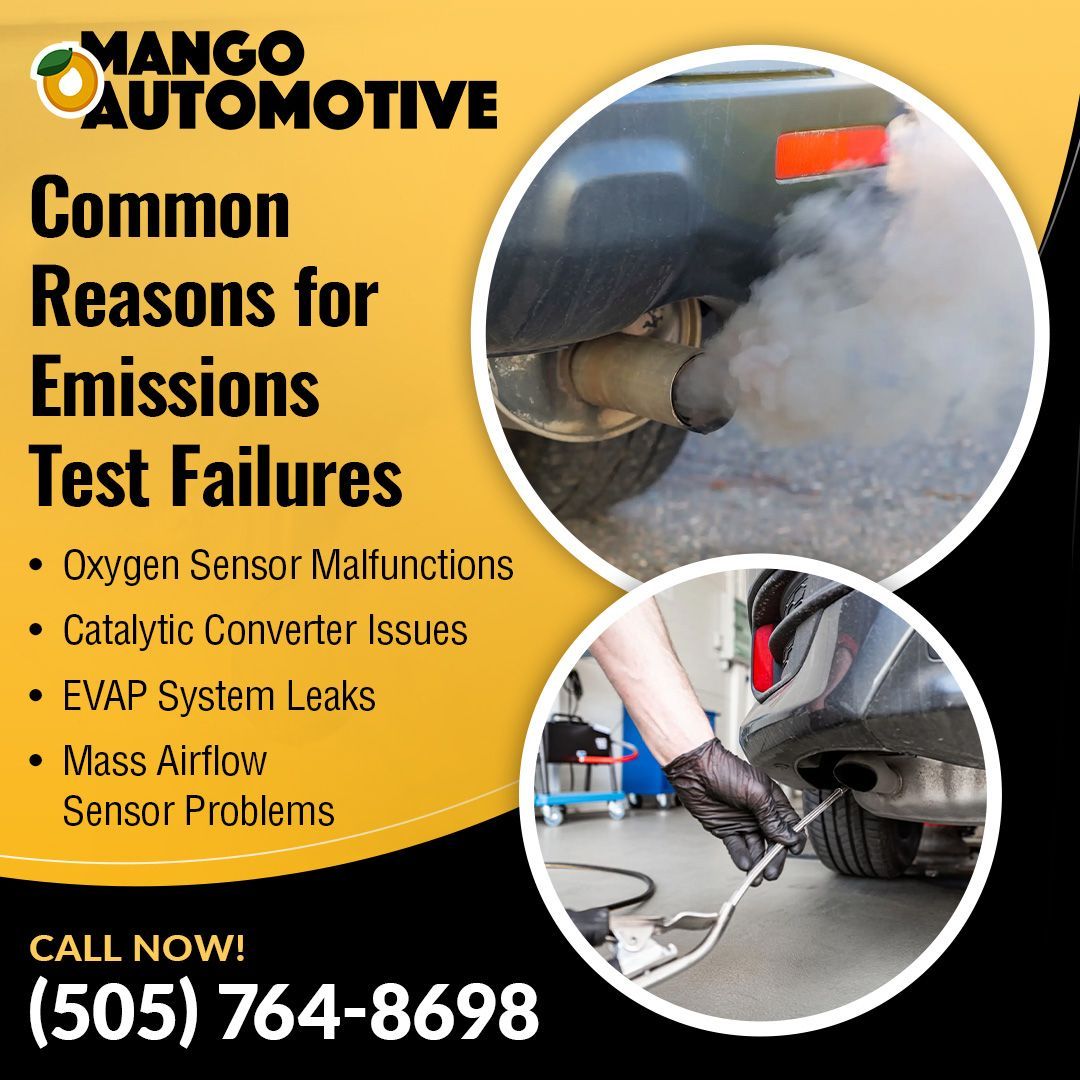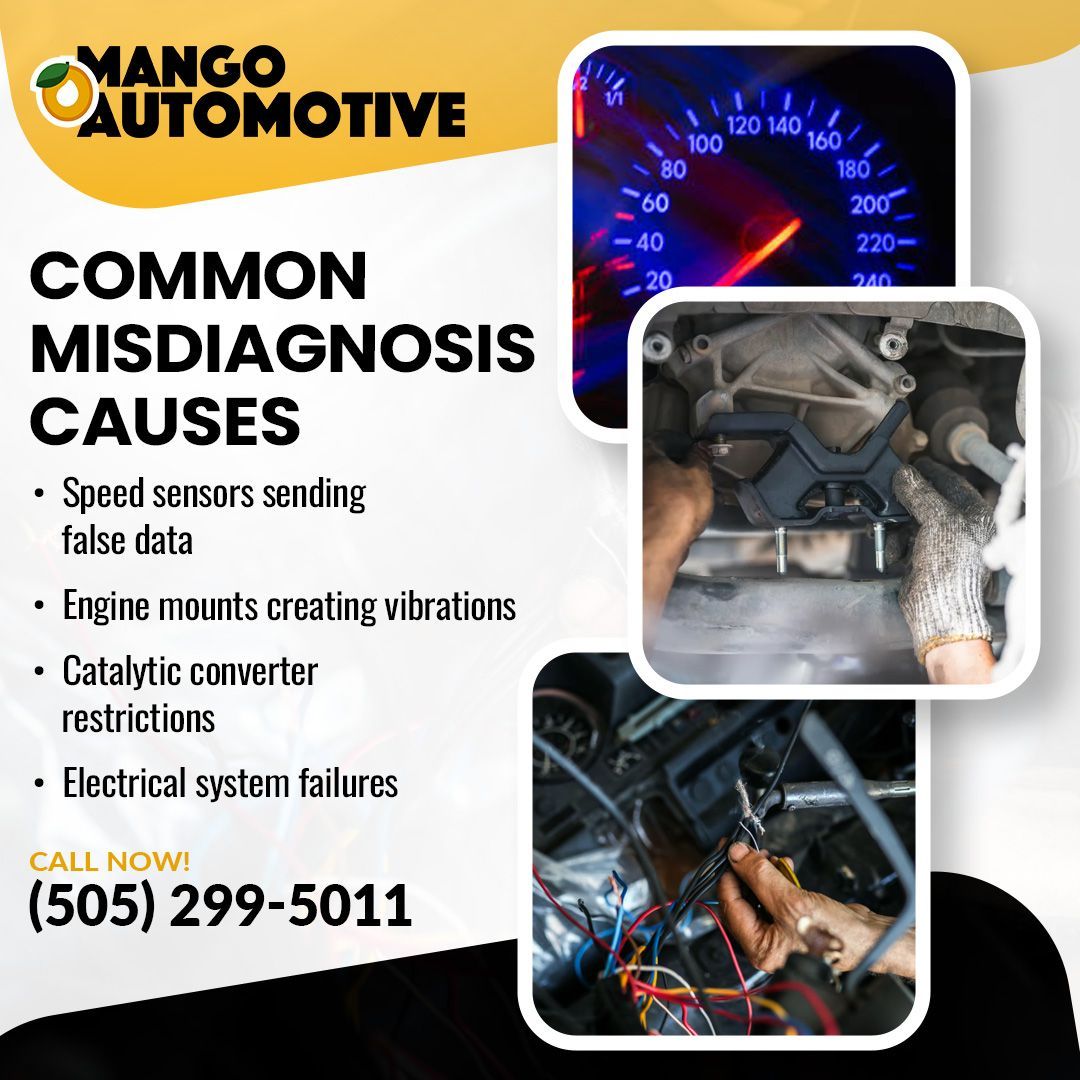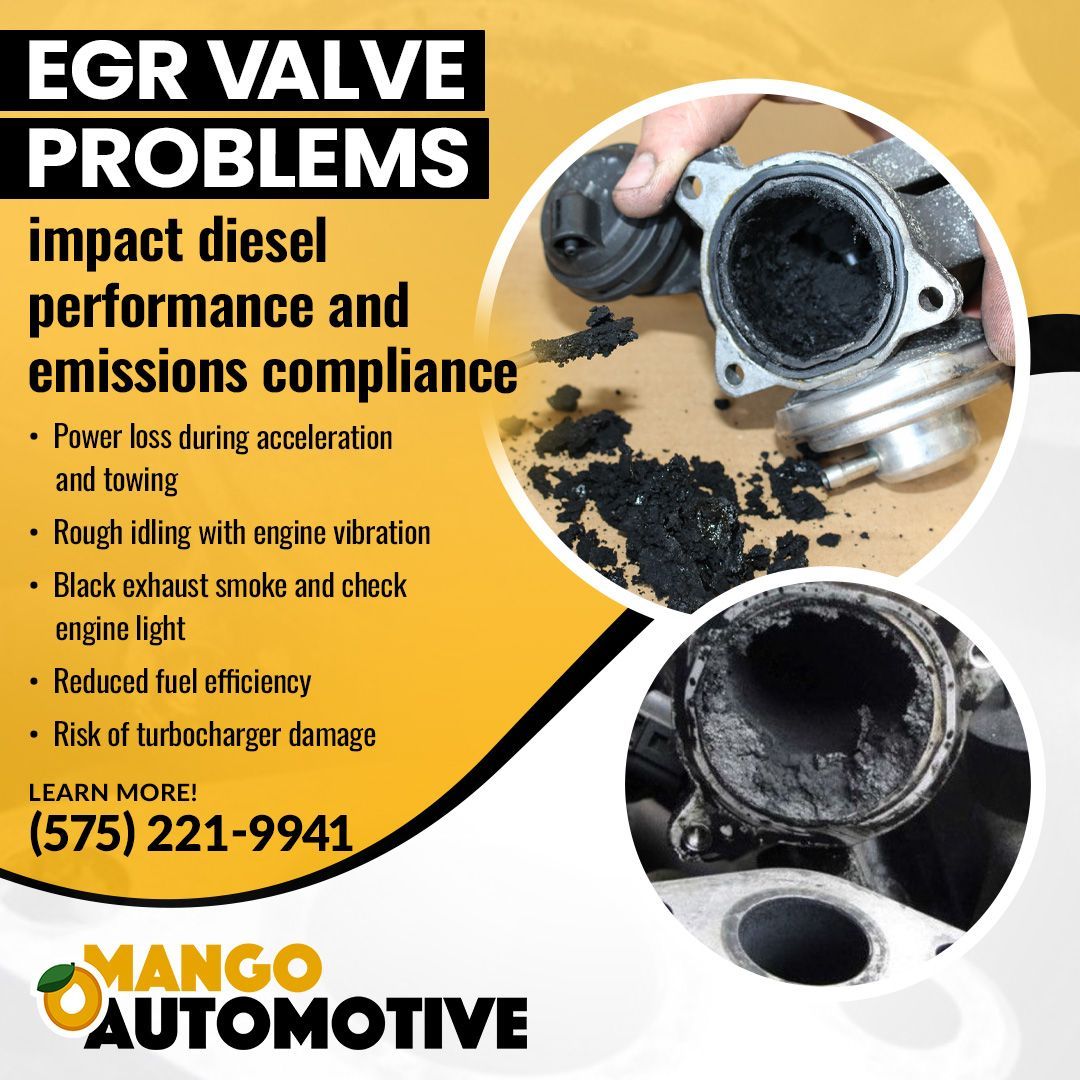Avoid Emissions Test Failures with Expert Auto Mechanics in Albuquerque
Failing an emissions test can prevent your vehicle from being legally registered in Albuquerque. If your car doesn’t meet state emissions standards, you may need repairs before you can renew your registration. Older cars, high mileage vehicles, and those with engine or exhaust issues are more likely to fail. Common causes include faulty oxygen sensors, a failing catalytic converter, or a loose gas cap.
At
Mango Automotive, our
auto mechanics in Albuquerque specialize in emissions-related repairs. We diagnose and fix issues so your car can pass the test and stay road-legal. This article will explain why vehicles fail emissions tests and how to prevent it.

Understanding Vehicle Emissions Testing in Albuquerque
What Is an Emissions Test?
An emissions test measures the pollutants coming from a vehicle’s exhaust to make sure it meets environmental standards. The test checks for harmful gases like carbon monoxide, nitrogen oxides, and hydrocarbons.
Emissions tests help reduce air pollution and keep vehicles running efficiently. If your car emits too many pollutants, it may need repairs before passing. Issues with catalytic converters or oxygen sensors can cause high emissions.
Why Albuquerque Requires Emissions Testing
Emissions testing is required in Albuquerque to improve air quality and meet federal environmental standards. Vehicles in Bernalillo County must pass an emissions test every two years before registration is renewed.
Albuquerque has struggled with air quality due to its
high elevation and weather patterns. Testing makes sure that cars on the road meet emissions standards, reduces smog, and improves public health. Gasoline-powered vehicles older than four years and under 10,000 pounds must undergo testing.
How the Testing Process Works in New Mexico
The emissions test in Albuquerque depends on your vehicle’s age and model. Newer cars may only need an onboard diagnostics (OBD) test, while older vehicles require a tailpipe emissions test.
For OBD testing, a technician connects a scanner to your car’s computer system to check for emissions-related issues. Vehicles without an OBD system go through a tailpipe test, measuring exhaust gases directly. If your vehicle fails, repairs are necessary before retesting. At Mango Automotive, our mechanics in Albuquerque can diagnose and fix emissions problems to help your car pass.
Common Reasons for Emissions Test Failures in Albuquerque
Malfunctioning Oxygen Sensors
A faulty oxygen sensor can cause a vehicle to fail an emissions test by affecting fuel efficiency and increasing pollution. The sensor monitors oxygen levels in the exhaust and helps regulate fuel injection.
A failed oxygen sensor causes the engine to burn too much or too little fuel, leading to higher emissions. Signs of a bad sensor include poor gas mileage, rough idling, and a persistent check engine light. At Mango Automotive, we inspect and replace faulty oxygen sensors to restore proper emissions control.
Issues with the Catalytic Converter
A failing catalytic converter prevents a vehicle from reducing harmful emissions and leads to test failure. This component converts carbon monoxide, nitrogen oxide, and other toxic gases into less harmful substances before they exit the exhaust.
A clogged or damaged catalytic converter may cause sluggish performance, excessive exhaust smoke, or a rotten egg smell. If left unaddressed, it can trigger the check engine light and reduce fuel efficiency. At Mango Automotive, our mechanics in Downtown Albuquerque inspect and replace damaged catalytic converters to help vehicles meet emissions standards.
Check Engine Light Warnings and What They Mean
A check engine light can indicate several issues that may cause an emissions test failure. Common causes include a loose gas cap, failing sensors, or engine misfires.
Even if the vehicle seems to run fine, a check engine light can cause automatic failure during testing in Albuquerque. A diagnostic scan from a mechanic can pinpoint the problem before testing. At Mango Automotive, we offer expert diagnostics to address check engine light issues and improve emissions performance.
Problems with the Mass Airflow Sensor
A faulty mass airflow (MAF) sensor disrupts the air-to-fuel ratio and can cause a vehicle to fail an emissions test. The sensor measures the amount of air that enters the engine and helps regulate fuel injection.
When the MAF sensor malfunctions, the engine may run too rich or too lean, leading to higher emissions. Symptoms include rough idling, trouble accelerating, and decreased fuel efficiency. At Mango Automotive, we can clean or replace the sensor to restore proper engine performance.
Evaporative Emission Control (EVAP) System Leaks
An EVAP system leak can trigger the check engine light and lead to an automatic emissions test failure. This system prevents fuel vapors from escaping into the air.
Cracked hoses, loose gas caps, or failing purge valves are common causes of leaks. Drivers may notice a fuel smell or poor gas mileage. At Mango Automotive, our mechanics in Downtown Albuquerque can perform a smoke test to find and repair EVAP leaks before testing.
Fuel and Exhaust System Problems
Issues in the fuel or exhaust system can increase emissions and prevent a vehicle from passing the test. Common problems include clogged fuel injectors, a faulty fuel pressure regulator, or exhaust leaks.
A restricted fuel system may cause poor combustion, while an exhaust leak can let unfiltered gases escape. Signs include unusual engine noises, reduced power, or an activated check engine light. Mango Automotive inspects and repairs these systems to improve emissions performance.
How Albuquerque’s Climate Can Impact Emissions Performance
Extreme temperatures and high altitude can affect a vehicle’s emissions system, making test failures more likely. Cold weather may cause fuel condensation, while heat can worsen EVAP leaks.
Albuquerque’s elevation also impacts air-fuel mixture ratios. Less oxygen availability at higher elevations can lead to incomplete combustion and higher emissions. Regular maintenance from mechanics in Albuquerque, like Mango Automotive, can keep emissions systems working efficiently despite local conditions.
How to Prevent an Emissions Test Failure in Albuquerque
Regular Vehicle Maintenance and Inspections
Routine maintenance is the best way to prevent emissions test failures. Regular oil changes, air filter replacements, and inspections of key components keep emissions levels low.
Albuquerque drivers should schedule tune-ups to check for worn spark plugs, faulty sensors, or clogged fuel injectors. At Mango Automotive, we offer repairs to make sure a vehicle meets New Mexico’s emissions standards before testing.
Addressing Check Engine Light Issues Promptly
Ignoring a check engine light can result in an automatic test failure. This warning often signals emissions-related issues, such as a bad oxygen sensor, catalytic converter failure, or EVAP leaks.
Getting a diagnostic scan from experienced auto mechanics in Albuquerque, like Mango Automotive, can identify the exact problem. Fixing the issue early on can improve the chances of passing the emissions test.
Using the Right Fuel and Engine Oil
Using the recommended fuel and oil helps the engine run efficiently and reduces emissions. Low-quality or incorrect fuel can cause carbon buildup, while improper oil viscosity affects engine performance.
Albuquerque’s high altitude may require specific fuel adjustments, and choosing synthetic oil can reduce engine deposits. At Mango Automotive, we use the right products for our services, which helps the emissions system maintain its health.
Ensuring Proper Tire Pressure and Engine Performance
Keeping tires properly inflated and the engine in top shape reduces emissions. Underinflated tires put extra strain on the engine, leading to higher fuel consumption and more pollutants in the exhaust.
At Mango Automotive, we recommend checking tire pressure regularly and keeping it at the manufacturer’s recommended level. This simple step improves fuel efficiency and reduces emissions. Our mechanics in Downtown Albuquerque also inspects air filters, fuel injectors, and other key components to make sure your engine runs efficiently before an emissions test.
How Albuquerque’s Altitude Affects Vehicle Emissions
Albuquerque’s high elevation can affect how a vehicle burns fuel, which may lead to higher emissions. With thinner air at over 5,000 feet, engines may struggle to maintain the right air-to-fuel ratio, especially in older vehicles.
Newer cars often adjust automatically, but older models may need tuning. We check your air filter, fuel system, and engine settings to keep your vehicle performing well in Albuquerque’s conditions. If you’re preparing for an emissions test, our auto mechanics in Albuquerque can help to keep your vehicle running as efficiently as possible.
What to Do If Your Car Fails an Emissions Test in Albuquerque
If your vehicle doesn’t pass an emissions test, it’s important to address the issue quickly to stay compliant with state regulations. In many cases, a failed test is caused by minor issues like a faulty oxygen sensor or a loose gas cap, but some failures require in-depth repairs.
At Mango Automotive, we diagnose the problem and provide the necessary repairs to prepare your car for retesting. Our experienced mechanics in Albuquerque will also help your vehicle meet emissions standards.
Actions to Take After a Failed Emissions Test
Review the emissions test report to identify the cause of failure. The report will outline problem areas, such as high emissions levels or system malfunctions. Then, schedule a diagnostic check with trusted mechanics in Albuquerque and get the repairs done. Once repairs are completed, your vehicle can be retested to ensure compliance.
Understanding New Mexico’s Retesting and Repair Requirements
New Mexico allows one free retest within 90 days after a failed emissions test. If your vehicle doesn’t pass the second time, additional repairs may be required before another test can be performed. Our team at Mango Automotive provides the necessary repairs to make sure your vehicle meets all requirements before retesting.
How Mango Automotive Can Help with Repairs and Retesting
We provide repair services to help Albuquerque drivers stay compliant with state regulations. Whether your vehicle needs a minor sensor replacement or a full catalytic converter repair, our team can handle the job.
If your car has already failed, we’ll make the necessary repairs and help you pass the retest. Contact Mango Automotive today to schedule an appointment with our auto mechanics in Albuquerque.
Emissions Repair Services at Mango Automotive
We offer full emissions diagnostics and repairs to help your vehicle meet New Mexico’s emissions standards. Our services include:
Oxygen sensor replacement:
Faulty sensors can cause increased emissions and poor fuel economy.
Catalytic converter repairs: A failing catalytic converter can lead to high emissions and a failed test.
EVAP system diagnostics: Leaks in the evaporative emissions system can trigger a failed inspection.
Mass airflow sensor and fuel system repairs: Ensuring proper fuel combustion reduces excess emissions.
Our
mechanics in Downtown Albuquerque provide efficient and accurate repairs, helping you pass your emissions test and get back on the road.

Keeping Your Vehicle Road-Ready with Mango Automotive
Passing an emissions test is easier with proper maintenance and expert repairs. At Mango Automotive, we help Albuquerque drivers keep their vehicles running efficiently while staying compliant with New Mexico’s emissions standards. Whether you need emissions-related repairs or routine maintenance, our skilled team is here to assist you.
Don’t let a failed emissions test keep you off the road. Mango Automotive provides expert diagnostics, repairs, and maintenance to help your vehicle meet New Mexico’s emissions standards. Call us today at
(505) 764-8698 to schedule an appointment with our trusted auto mechanics in Albuquerque.













